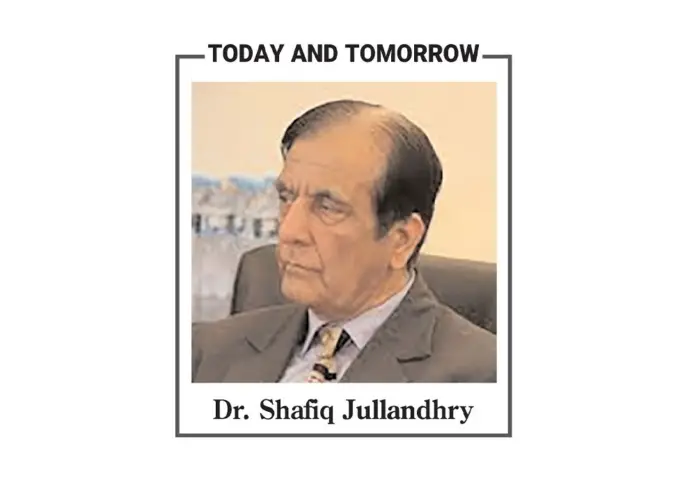When we were small children, we wanted to have many things we couldn’t have until we came to the school-going age; even at that age, there was a need to wait for years to join some profession. In a job, people wait for years to become experts. Emerson rightly advises, ‘adopt the pace of nature: her secret is patience’. Patience and tolerance are essential qualities of successful people. Impatience always puts us on the wrong track. To reach the destination of success, there are no shortcuts. Clarity of objectives and targets, determination, patience, and consistency are the formulae of a purposeful and successful life. I am not so tolerant, but I firmly believe tolerance is the only real test of civilization. One can earn respect if they are passive and make timely decisions.
I want to quote two miner examples of my life that I told my friend Javed Iqbal Piracha. He was my university class fellow, a close friend, who shared a room with me for five years in the famous Rasul Chambers in Old Anarkali, Lahore. He was a man of principles and never compromised on his principles. During our university days, while living with some friends in Rehman Manzil in Lahore’s Rehmanpura, Piracha was also living nearby as a paying guest in an old lady’s house. His expenses were the lowest amongst us, and his living was simple. When we used to finish all of our money much before the end of the month, it was Javed Iqbal Piracha, who was always available to us for borrowing some money.
Whenever, he visited our lodge in Rehman Manzil, there was always a wave of happiness in our friends. For him, we used to prepare special tea with a lot of milk, sweet rusks with tea were always his favorite. On such occasions, our friends’ group enjoyed many jokes and gossip, including Tanvir Shahid and Mehboobul Haq Dar. Javed Iqbal Piracha was fond of music and had a mouth organ; when the friends were in the mood, he started playing the mouth organ, and Tanvir Shahid, with his fat belly, used to dance to the tune of his musical instrument. It was always so amusing, and laughter created was enough to wash out the boredom of weeks from our minds. After completing my MA, I stayed in Rasul Chambers for about five years.
Javed Piracha shared my room for five years; during those days, he was the news editor of the Pakistan Television. One night, he came back to the residence very late. He was too tired and sad. He fell on his bed and said, “Shafiq Jullandhry, I have been insulted today badly. You cannot imagine what happened to me. I am coming from Rawalpindi, and it took me twelve hours to reach Lahore, and I managed to reach here after changing seven buses.” It is strange; I asked: did the tyres of every bus you get in become flat every time? He said: No, it happened, so the first bus I boarded was overloaded. Three-four people on the bus didn’t find any seats and were standing. After some miles of coming out of Rawalpindi, there was a raid from the magistrates, and police contingent.
They were fining heavily buses with overloading. But I saw that our bus conductor gave some money to a police officer and returned to the bus immediately. Police were befooling the people and collecting bribes in front of all. I asked the driver to stop for a moment, came out of the bus, met a magistrate, and after introducing myself, I told him that a policeman had received a bribe from our bus conductor and the bus had not been fined for the overloading. They apologized and immediately fined our bus. The conductor paid the fine and was staring at me. The bus started again, and after reaching about twenty miles ahead, it stopped. The conductor returned my fare and asked me to go out of the bus because I got them fined.
After unloading from that bus, I waited for another Lahore-bound bus. The second bus I got also stopped after covering only 10 miles. The conductor of the last bus came in this bus and asked the conductor of this bus to drop me off because I got their bus fined by the magistrate. The conductor and driver of this first bus kept getting me dropped off from other buses after a short distance. It was the seventh bus through which I was able to reach Lahore. When I arrived and dropped off the bus, the first bus stopped nearby. The bus passengers were also in great trouble and spent twelve hours reaching Lahore. When they looked at me, they burst into laughter, which was the moment of my extreme depression.
Piracha said, “I tried to represent the passengers facing overloading trouble, but no one of them stood on my side. On the other hand, they were ridiculing me and didn’t have a feel of the hardship which they had been facing themselves for 12 hours. They were enjoying my ordeal. Then Piracha asked me; how can we change attitudes and behaviors of our people? I explained my point of view to him with two similar examples from my travel. After listening to me, Piracha asked me: “If this was the more appropriate way to tackle such a position, then why didn’t you tell me before?” I said: “Because you didn’t commit this blunder before. But for my readers, I will tell those two examples next time and hope they will not face any such position before they read it.”







